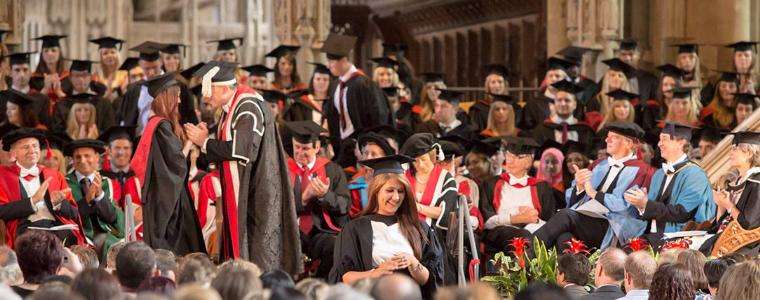Book unveils findings of study examining role of social class in higher education

The findings of a study exploring how social class influences students' experiences in higher education have been revealed in a new book.
Higher Education, Social Class and Social Mobility: The Degree Generation is based on the results of a research project which followed the fortunes of 88 undergraduate students at Bristol's two universities during their three-year educational journey.
In the Paired Peers study, researchers explored how attending an 'elite' university or 'new' university impacted on students from different social classes. Students were paired by university, subject of study and class background so the trajectories of middle-class and working-class undergraduates could be compared.
The study found the university experience continued to be 'saturated by class', with middle-class families - informed by a knowledge of how to 'play the game' – often encouraging their children to undertake extracurricular and university society activities that help them maintain their class position.
Among the central findings of the research, conducted by the University of the West of England (UWE Bristol) and the University of Bristol, were:
- Middle-class families can use their knowledge of the system to aid their children into top universities. They use 'social capital' to access internships and secure jobs.
- Working-class candidates have to work harder to get to university, with less help from schools and parents. They are disadvantaged by the necessity for term time work and financial struggles.
- Academic results were similar for both groups
Co-author Dr Richard Waller, an Associate Professor of the Sociology of Education at UWE Bristol, said: "The book argues that for middle-class students a degree may offer a means of further upward mobility; however, what is increasingly apparent, is that for the middle-classes higher education acts as an instrument of class maintenance, and a means of trying to prevent downward mobility. In other words, higher education acts as both a vehicle for social mobility and a mechanism for reproducing the existing structures of inequalities.
"We were surprised at the extent to which some middle-class students would strategically look to enhance their CVs - they went to university knowing that's what they had to do to compete for the top graduate jobs. They wouldn't just join a student group or society – they would become the president of the society or, in some cases, start their own society, primarily because it would look good on their CV. They were 'playing the game' to achieve the competitive graduate positions.
"Overall, the book makes an important and timely contribution to the debate around higher education and if it can offer a way of addressing social inequalities and increasing social mobility."
The study, funded by the Leverhulme Trust and carried out between 2010 and 2013, has received recognition from educational organisations including the Higher Education Funding Council for England and the UK Office for Fair Access for the potential impact it could have on higher education policy.
Professor Les Ebdon, Director of the UK Office for Fair Access, said the book 'adds a strong and authoritative voice to the debate of widening participation'.
The study has now continued into a second phase, which is focusing on how students' backgrounds and social class affects their ability to move into graduate careers and make progress in them.
Dr Waller, who worked on the study alongside fellow academics Ann-Marie Bathmaker, Nicola Ingram, Jessie Abrahams, Tony Hoare and Harriet Bradley, said: "Are graduates from the University of Bristol in an advantageous position over those from UWE Bristol when it comes to their careers? We are also asking students what they got from their university experience. Did the experience help them get a job and what more could be done to help them?"
The book – which will be launched at an event at the Arnolfini arts centre in Bristol - is available from Amazon here priced at £54.
Provided by University of Bristol


















